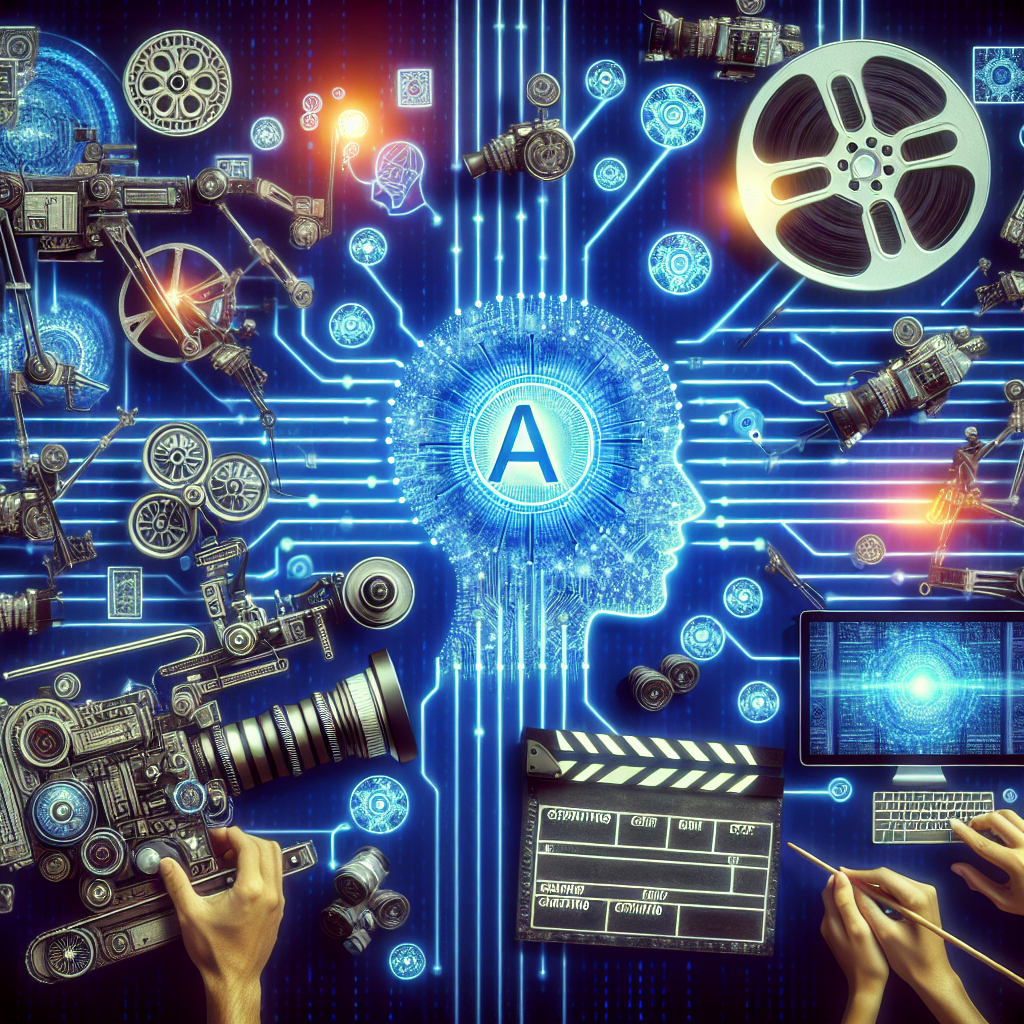Generative artificial intelligence (AI) has been making waves across various industries, and the film industry is no exception. From scriptwriting to visual effects, generative AI is reshaping how films are created, allowing filmmakers to explore new creative possibilities and streamline their production processes. In this article, we will explore how generative AI is revolutionizing the film industry and the implications it has for the future of filmmaking.
One of the key areas where generative AI is making a significant impact in the film industry is in scriptwriting. Traditionally, scriptwriting is a time-consuming and labor-intensive process that requires a great deal of creativity and skill. However, generative AI has the ability to analyze vast amounts of data from existing scripts and generate new, original content. This can help filmmakers come up with fresh ideas, develop storylines, and even create dialogue that feels authentic and engaging.
For example, companies like OpenAI have developed AI models like GPT-3, which is capable of generating human-like text based on a given prompt. This technology can be used to assist screenwriters in developing scripts, brainstorming ideas, and even creating dialogue for characters. By leveraging generative AI in scriptwriting, filmmakers can save time and resources while also tapping into a wealth of creative possibilities that may not have been explored otherwise.
Another area where generative AI is transforming the film industry is in visual effects. Traditionally, creating visual effects for films required a team of skilled artists and technicians to painstakingly animate and render each frame. However, generative AI has the potential to automate and expedite this process, allowing filmmakers to create stunning visual effects more efficiently and cost-effectively.
For example, companies like NVIDIA have developed AI models like GANs (Generative Adversarial Networks) that can generate realistic images and videos. This technology can be used to create lifelike visual effects, such as realistic creatures, environments, and special effects. By leveraging generative AI in visual effects, filmmakers can bring their creative visions to life in ways that were previously unimaginable.
Generative AI is also revolutionizing the way films are marketed and distributed. With the rise of streaming platforms like Netflix and Amazon Prime, filmmakers are looking for innovative ways to reach audiences and stand out in a crowded marketplace. Generative AI can help filmmakers analyze audience data, predict trends, and even personalize marketing campaigns to target specific demographics.
For example, companies like ScriptBook have developed AI models that can analyze scripts and predict a film’s potential success based on factors like genre, cast, and plot. This technology can help filmmakers make informed decisions about which projects to pursue and how to market them effectively. By leveraging generative AI in marketing and distribution, filmmakers can reach a wider audience and maximize their film’s potential for success.
In addition to scriptwriting, visual effects, and marketing, generative AI is also being used in other areas of film production, such as editing, sound design, and even casting. By automating repetitive tasks and streamlining workflows, generative AI is enabling filmmakers to focus more on the creative aspects of filmmaking and less on the technical challenges.
However, as with any emerging technology, there are also challenges and ethical considerations to be aware of when it comes to generative AI in the film industry. For example, there are concerns about the potential for AI to replace human creativity and artistry, as well as the implications of using AI to manipulate and deceive audiences.
Additionally, there are questions about the impact of generative AI on jobs in the film industry, as automation could potentially displace certain roles and skills. Filmmakers and industry professionals will need to adapt to these changes and find ways to integrate generative AI into their workflows in a way that complements human creativity and expertise.
Overall, generative AI is reshaping the film industry in profound ways, offering new opportunities for creativity, efficiency, and innovation. By embracing this technology and exploring its potential applications, filmmakers can take their craft to new heights and create truly groundbreaking films that captivate audiences around the world.
FAQs:
Q: What is generative AI?
A: Generative AI refers to artificial intelligence technologies that can generate new, original content based on a given input or dataset. This includes text, images, videos, and other forms of creative output.
Q: How is generative AI being used in the film industry?
A: Generative AI is being used in various aspects of film production, including scriptwriting, visual effects, marketing, distribution, editing, sound design, and casting. By automating repetitive tasks and streamlining workflows, generative AI is enabling filmmakers to focus more on the creative aspects of filmmaking.
Q: What are the benefits of using generative AI in the film industry?
A: The benefits of using generative AI in the film industry include saving time and resources, exploring new creative possibilities, streamlining production processes, reaching wider audiences, and maximizing a film’s potential for success.
Q: What are the challenges of using generative AI in the film industry?
A: Some challenges of using generative AI in the film industry include concerns about the potential for AI to replace human creativity, ethical considerations about manipulating and deceiving audiences, and the impact on jobs and skills in the industry.
Q: How can filmmakers adapt to the rise of generative AI in the film industry?
A: Filmmakers can adapt to the rise of generative AI by embracing this technology, exploring its potential applications, integrating it into their workflows in a way that complements human creativity and expertise, and finding ways to stay ahead of the curve in a rapidly evolving industry.

